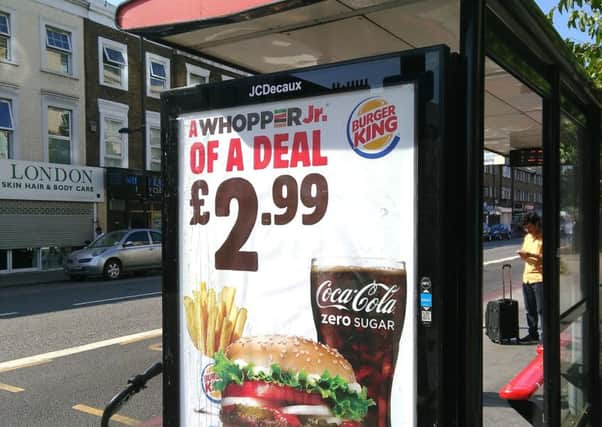David Behrens: Inconvenient truths about eating and the recipe for bad health


It seemed to us wayward, but it was the thin end of the wedge. Not long after, someone turned up wearing a football shirt tucked into his trousers.
It had always been the custom to break up the morning with a coffee and a bacon sandwich, and at a couple of places I worked, a trolley would trundle round with piles of them at prices subsidised by the management. But there had somehow been a distinction between home food and work food.
Advertisement
Hide AdAdvertisement
Hide AdThe extent to which such etiquette has been swept away on the current of convenience was laid bare this week by a set of statistics revealing that people on their way to the office now spend up to £11 on their morning coffee and croissant. For that money, I’d expect an all-you-can-eat buffet.
Harrogate is said to be the most profligate town in the country for those eating breakfast from a bag, and Wakefield, where the average daily spend is just £2.24, the least so.
Munching granola at one’s desk no longer attracts raised eyebrows; a generation younger than me has grown up believing it to be the norm. But it would be difficult to conclude that the unchecked expansion of the convenience food industry has been beneficial to all.
Artisan bakeries dispensing croissants – no matter how much salt and butter they contain – are one thing, but most of the sales are further down the food chain, and it has become increasingly apparent that the voluntary guidelines in place to protect children and other vulnerable types from the aggressive marketing of snacks high in fat, sugar or salt has failed to do any such thing.
Advertisement
Hide AdAdvertisement
Hide AdAn all-party group of MPs concluded as much earlier this month when it recommended that the Government introduce statutory controls if it was serious about stemming the rising tide of obesity – the cause of Type 2 diabetes in thousands of youngsters. There should be a ban, it said, on child-friendly characters being used to advertise junk food, and a tightening of the regulations on where adverts can be placed online.
Proof that the voluntary code is not working came on Monday, with the revelation that posters for Burger King and McDonald’s had been placed less than 100 metres from the gates of two primary schools, in spite of directives to the contrary from the Advertising Standards Authority.
A further poster for a “chocolate honeycomb iced frappé”, which appeared a similar distance from a nursery and children’s centre, did not even contravene the rules, despite making even the most buttery croissant seem like a healthy option.
Our casual adoption of unsuitable diets and eating habits is now endemic. Within another generation, it may be as ingrained as in the USA, where fast food was invented and where 70 per cent of adults are now overweight.
Advertisement
Hide AdAdvertisement
Hide AdEven now, in parts of our own region, nearly a third of four and five-year-olds are overweight or obese and will likely cost the economy £215m in later life. That was the finding of a report this week from the council in Hull, where sick days due to obesity cost around £76,000 a year. The statistics for Bradford are almost equally grim.
Not many of us need to look too far from our own homes to find contributory evidence. My son is a student and thus except from civilised culinary conventions – but even so, his fondness for takeaway chicken and pizza alarms me. They’re not only bad for him but they’re not even cost-efficient. Not as expensive as a breakfast bun in Harrogate, maybe, but not cheap. Whatever happened to beans on toast?
When he texted the other day to ask how to cook the sort of rice that could not just be placed in its pouch in a microwave, I had to concede that my parenting had failed him.
The point here is that we can all eat lazily when it suits us, but not all of us can be protected from ourselves.
Advertisement
Hide AdAdvertisement
Hide AdThe creeping casualisation that began with those office breakfasts of 25 years ago has become insidious, and I’m afraid those MPs may be right: as a society we have regressed to the point where we are going to have to be spoon fed.